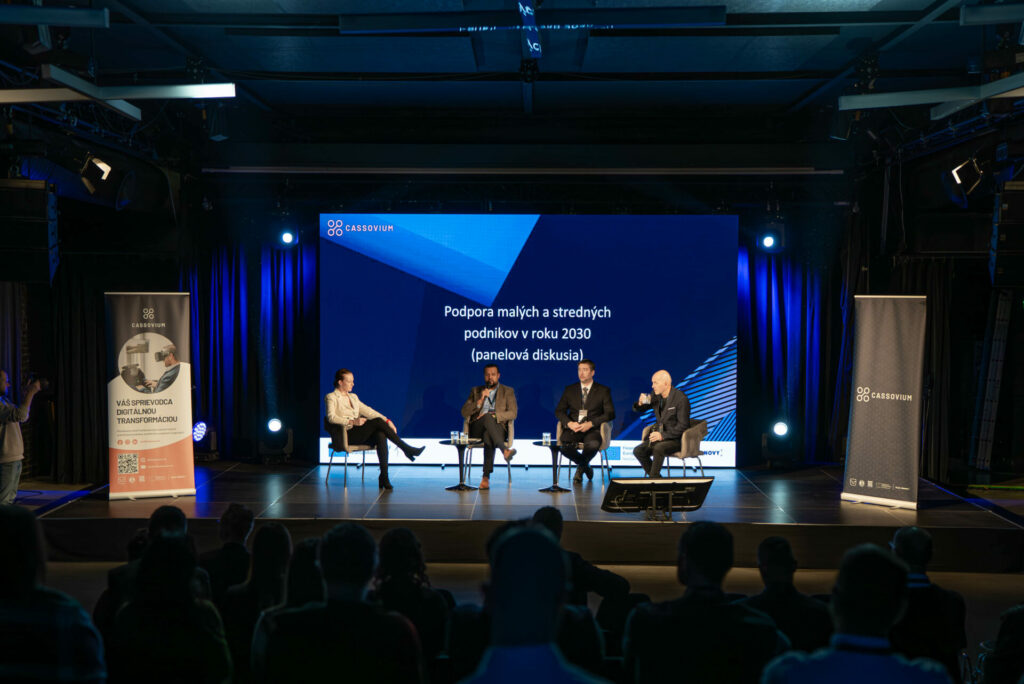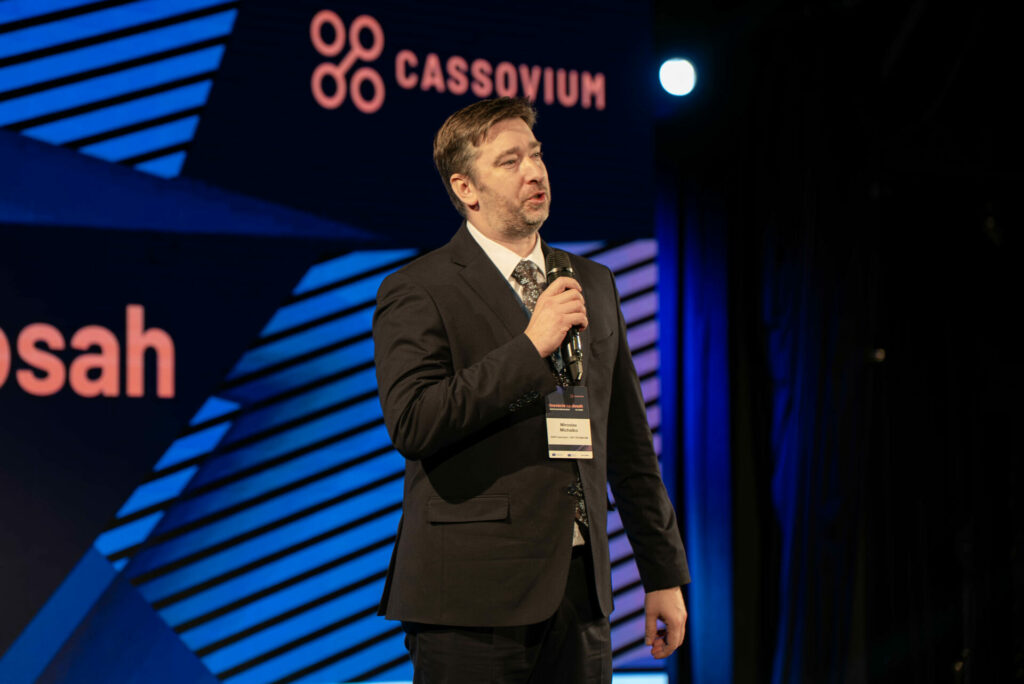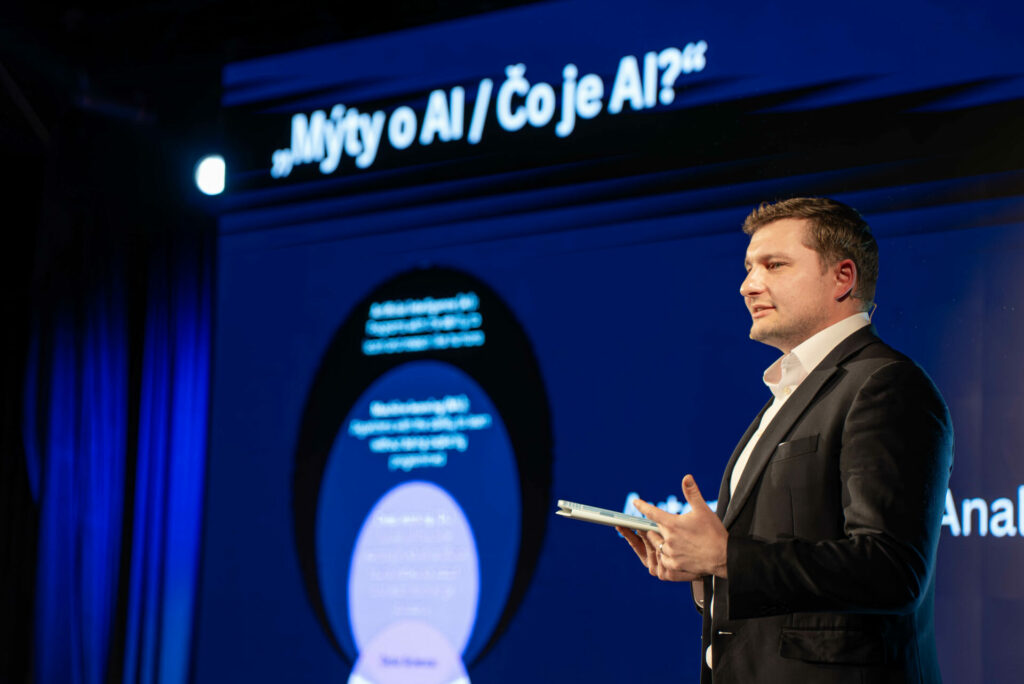Small and medium-sized entrepreneurs are being forced to face a growing number of ongoing technological challenges. The question of how technological trends are transforming business, not only in Eastern Slovakia, was the central topic of the conference Innovation Within Reach – The Digital (R)evolution, organized by EDIH Cassovium on Tuesday, March 18, at the Kasárne Kulturpark venue in Košice.
“It’s important to realize that everything is changing rapidly. Each year brings a major innovation that transforms the market, technologies, and expectations placed on employees. This is especially demanding for small and medium-sized enterprises. Yet these very SMEs significantly contribute to the development of the European Union, while at the same time being the most affected by technological innovations. On top of that, the world has globalized – and in such a large market, if you’re not innovating, you’re falling behind,” stated Associate Professor Miroslav Michalko, General Manager of the EDIH Cassovium consortium and Director of UVP Technicom.
Professor of Public Health and Head of the Department of Infectology and Travel Medicine at the Faculty of Medicine of UPJŠ in Košice, Pavol Jarčuška, emphasized the importance of identifying the real needs of small and medium-sized enterprises: “They are often radically different from what we assume in the academic world. Slovakia is significantly lagging behind in the cooperation between universities and SMEs.”
Miriama Hučková, Executive Director of Košice IT Valley, pointed out that the IT sector is thriving in Eastern Slovakia. However, she noted a strong need to strengthen the pillar of small and medium-sized businesses. “They are the most vulnerable group, but thanks to the EDIH Cassovium consortium, we are able to help them.”
EDIH Cassovium offers entrepreneurs not only consulting and support in the field of digital technologies and access to the latest trends and solutions, but also opportunities for testing, pilot projects, networking, and collaboration with experts. More than 170 services are available, and clients do not pay for the services provided. Conference participants also heard real-life stories, with representatives of IPC Refractories and Dog Moments Art presenting their projects supported by EDIH Cassovium.
Slovakia is significantly lagging in digital performance
During the panel discussion, experts concluded that Slovakia is significantly behind in terms of digital performance.
“This is not just a feeling – it’s a fact. If nothing changes, we will cease to be economically relevant as a country. We’ll begin to lose our place in the market. Yet it is precisely small and medium-sized enterprises that form the backbone of the European Union,” said Samuel Arbe, co-founder of the Center for Innovative Healthcare, consultant for the World Bank, and program director of ITAPA.
Michalko expressed concern that the overall trend in this area is negative. “It’s our own fault. We can’t say we didn’t have the right conditions for innovation development. On the contrary, we had ideal conditions, but we didn’t make use of them. We underestimated education, and the outlook isn’t very good. We lack sufficient funding for innovation. It’s also a result of the atmosphere in society, where people working in this field are often criticized.”
Martin Morháč, representative of the European Digital Innovation Hub EDIH Expandi, emphasized that innovation must be seen as a balanced ecosystem. Financial resources alone are not enough – proper conditions must be in place, and there must also be demand.
Cybersecurity Still Underestimated
According to experts, small and medium-sized enterprises in Slovakia still see spending on cybersecurity as unnecessary. That’s why there is a critical need to change how businesses think about innovation. However, the issue often comes down to funding.
“SMEs in this area are also dependent on subsidies, but subsidy schemes are scarce. There are many European calls, but they are often hard to access for small and medium-sized businesses,” pointed out M. Michalko. This is why EDIH Cassovium is a great opportunity for entrepreneurs – for example, to gain a competitive edge through data analysis.
“Data analysis is a major issue in the European Union. At EDIH Cassovium, we analyze your current situation and help you understand how to use your data to move forward,” explained Gabriel Semanišin from UPJŠ.
According to Juraj Sabol from U.S. Steel, AI is both an opportunity and a trap.
“The threat doesn’t lie in AI replacing you, but in businesses that use AI destroying those that don’t.” Overall, artificial intelligence can be summed up by the phrase: “less time on routine, more time on strategy.”
Conference participants also drew inspiration from best practice examples of successful companies. Their stories were shared by Viktor Sučka, CEO of SWIDA Innovative, Slavomíra Kollárová, CEO of Inspio, and Dalibor Cicman, CEO of GymBeam. They spoke about their entrepreneurial journeys and unanimously agreed that in the near future, employee adaptability and the ability to adopt new technologies will become increasingly important.






